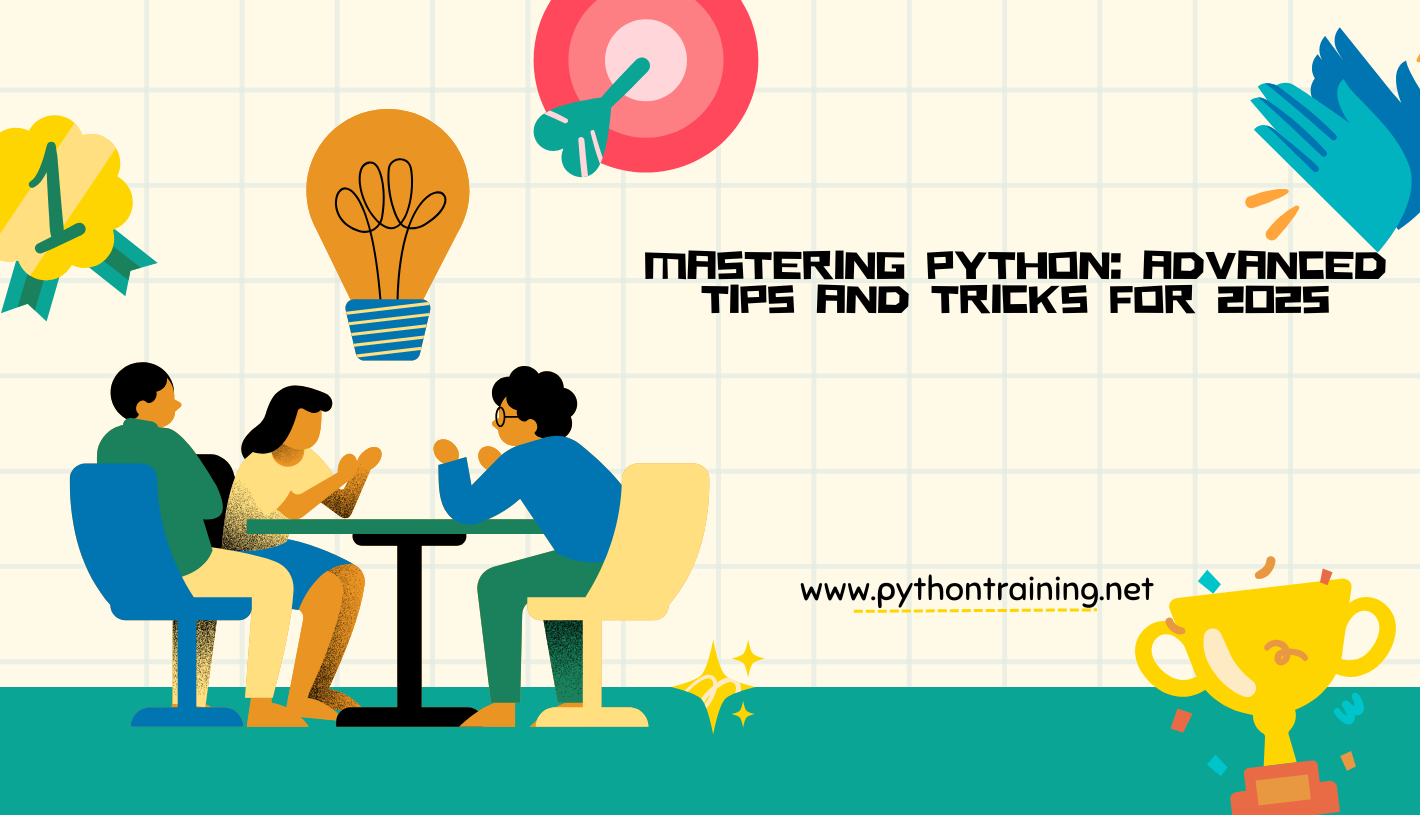Mastering Python: Advanced Tips and Tricks for 2025
Python remains one of the most popular programming languages, celebrated for its simplicity, versatility, and powerful features. Whether you’re a beginner or an experienced developer, mastering Python can elevate your skills to the next level. In this article, we’ll explore advanced tips and tricks that will help you become a Python expert in 2025.
Introduction to Python
This section provides an overview of Python, its evolution, and why it continues to dominate the programming world. We’ll discuss its syntax, dynamic typing, and the advantages it offers for rapid and scalable development.
Understanding Python Libraries and Packages
Python’s extensive ecosystem of libraries and packages continues to grow. In this section, we’ll explore popular libraries like NumPy, Pandas, and Matplotlib, along with new rising stars of 2025. We’ll also cover package management with pip, conda, and emerging tools for better environment handling.
Enhancing Code Performance with Python
Writing efficient, high-performance Python code is critical for modern applications. This section covers profiling, optimizing algorithms, leveraging Just-In-Time (JIT) compilation with tools like Numba, and best practices for faster execution.
Advanced Data Manipulation and Analysis
Working with massive datasets is now more common than ever. Here, we’ll explore advanced techniques for data cleaning, preprocessing, and analysis using libraries like SciPy, scikit-learn, and new AI-driven data tools introduced in 2025.
Object-Oriented Programming in Python
Python’s support for object-oriented programming (OOP) remains essential. This section explains key concepts such as classes, objects, inheritance, and polymorphism, enhanced with practical 2025 examples for real-world applications.
Advanced Python Debugging Techniques
Debugging is a must-have skill. We’ll dive into advanced debugging techniques using updated tools like pdb++, logging improvements, and visualization tools for easier tracking and resolution of bugs in complex codebases.
Web Scraping and Automation with Python
Python’s capabilities in web scraping and automation continue to grow. Here, we’ll show how to scrape dynamic websites using libraries like Beautiful Soup 5, Playwright, and Selenium 4, and automate tasks using Python scripts and bots.
Building GUI Applications with Python
Python’s GUI development has evolved with frameworks like Tkinter, PyQt, and newer tools like Flet and Pynecone. This section will guide you through building sleek, modern, cross-platform desktop applications.
Data Visualization with Python
Data storytelling is more important than ever. We’ll explore how to create interactive and stunning visualizations using updated libraries like Plotly 5, Seaborn, and Altair, helping you communicate data-driven insights effectively.
Python for Machine Learning and Artificial Intelligence
Python remains the cornerstone of machine learning and AI. This section covers major libraries like TensorFlow 2.x, PyTorch, Hugging Face Transformers, and new lightweight frameworks emerging in 2025 for building faster and more efficient AI models.
Securing Python Applications
With growing security concerns, protecting Python applications is a priority. We’ll discuss input validation, encryption methods, securing APIs, and adopting security-first coding practices to build safer applications.
Best Practices for Python Development
To become a master developer, following best practices is key. We’ll highlight updated coding conventions (PEP 8+), project organization, documentation tools, unit testing, continuous integration (CI), and version control using GitHub’s latest features.
Exploring Python Frameworks
Frameworks like Django 5, Flask 3, FastAPI, and new entries in 2025 provide robust options for web and API development. We’ll explore their unique features and best use cases for modern development.
Python in the Cloud: Deployment and Scaling
Deploying Python applications at scale is easier but more complex in 2025. We’ll cover containerization with Docker, orchestration with Kubernetes, serverless options like AWS Lambda, Azure Functions, and new multi-cloud deployment strategies.
Conclusion
Mastering Python opens endless opportunities for developers. The advanced tips and tricks shared here are designed to help you build high-performance, secure, and scalable applications in 2025. Embrace Python’s power, keep learning, and unlock your full potential as a next-generation developer.
FAQs
- Is Python still beginner-friendly in 2025?
Yes, Python continues to be one of the easiest languages for beginners to learn, thanks to its clean syntax and growing educational resources. - Can I still use Python for web development?
Absolutely! Python frameworks like Django, Flask, and FastAPI make it a top choice for web and API development. - Is Python strong in machine learning and AI?
Python dominates the ML and AI space with powerful libraries like TensorFlow, PyTorch, and emerging lightweight frameworks in 2025. - How can I boost my Python code performance?
Optimize algorithms, use built-in functions, leverage JIT compilers like Numba, and profile your code to identify and fix bottlenecks. - Should I learn object-oriented programming in Python?
Definitely. Mastering OOP concepts makes your Python code more modular, reusable, and maintainable, which is essential for professional development.
